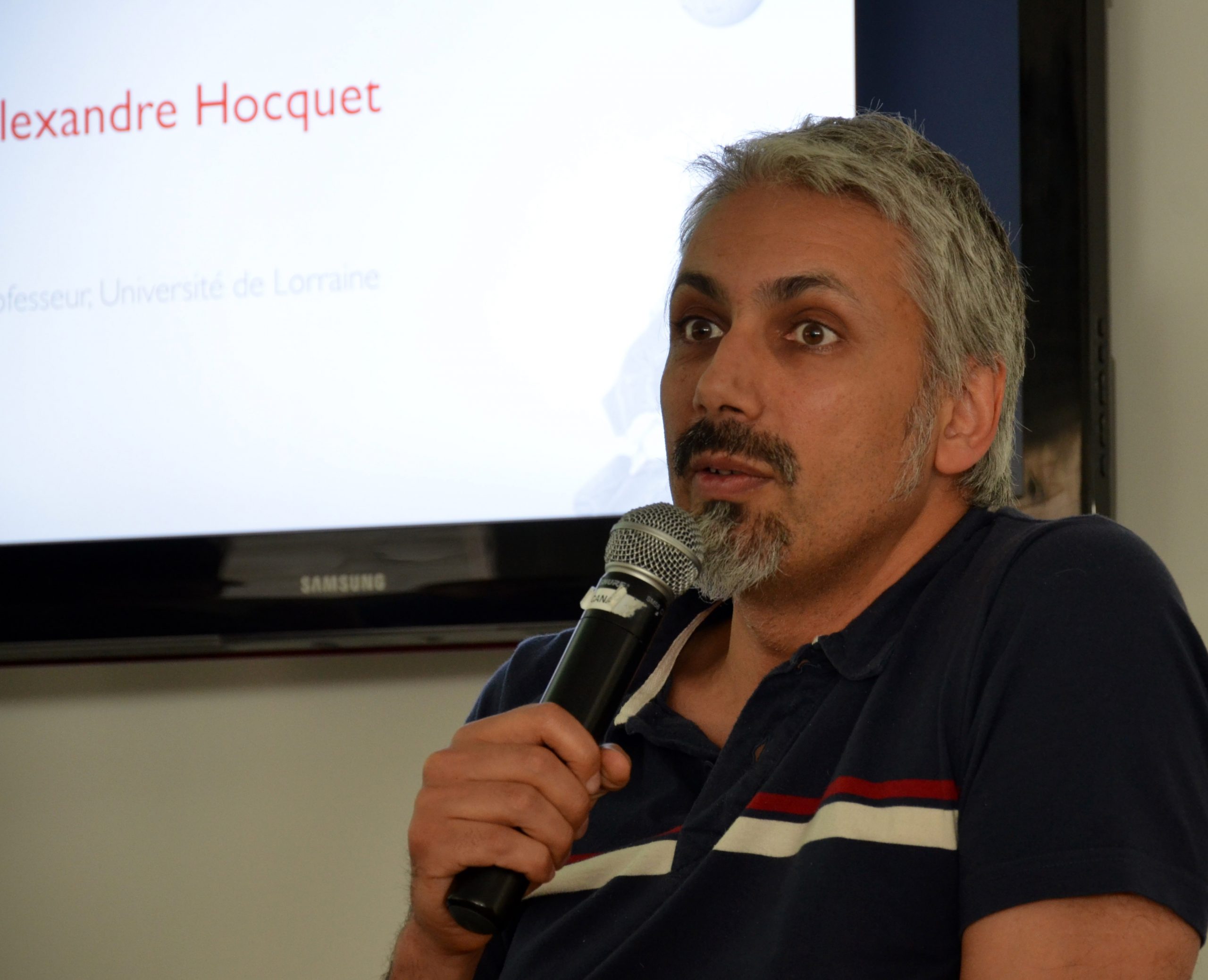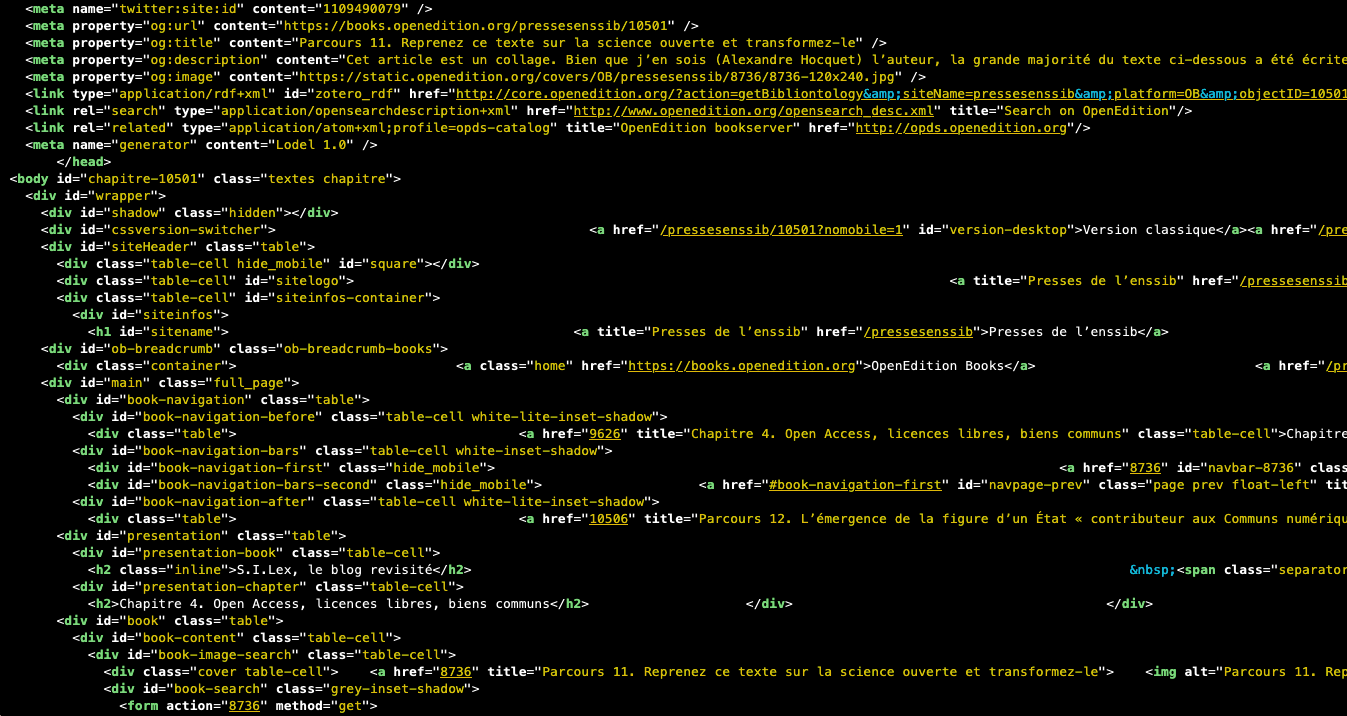ALEXANDRE HOCQUET
Together with ALIN OLTEANU, STEFANIE HAUPT
This text is a collage, licensed under a CC0 license. It was taken from another author, without mentioning or citing them. We changed the original, as this license allows doing so. The original arguments have been copied and pasted, passages have been deleted, their order has been changed and we added more text.[1]We have even let the originally French text run through an open source translation program. A new text emerged, which can suffer the same fate: you can steal this blog post.[2]The title is a reference to the 1970s counterculture textbook titled “Steal this book”. We are not the first to make use of this pun. See, for example, “Steal this review” by … Continue reading Indeed, this text is already a modified version of a first collage and a part of the ambition of this project is for the text to be reused and modified it several times. In this way, its possibilities to evolve increase!

Alexandre Hocquet
Senior Fellow at c:o/re (10/2021-03/2022)
Alexandre is Professor of History of Science at the Université de Lorraine, France, and Member of the Laboratory Archives Henri-Poincaré. He has published extensively on the topic of open science. This blog post is in fact an updated shorter version of a book chapter, and it is at the same time an experiment. So, please go ahead: Steal this post!
One of our research topics is the complexity of what does it mean to be open in science and what does this imply. This complexity includes the constellation of phrasings that are using “open” as a prefix (open knowledge, open science, open acess, open data, open source…). We are particularly interested in scientific software. In this context, the licenses of scientific software have a meaning that is often misunderstood. Beyond software, the creative commons licenses applied to scientific texts within the open access framework involve changes in the notion of plagiarism or auctoriality, notions that are often misunderstood as well.
In science, “Open” is a fuzzy word, a “floating signifier” to borrow from Ernesto Laclau. It contains several visions of the world that can be different or even incompatible. An operational way of removing this ambiguity is to actively learn about and engage with user licenses, an operating mode linked to the world of software.
The concept of Open Science tends to gain momentum, gradually becoming the new reference paradigm for the dissemination of research results. In particular, it was pushed by the European Union as part of the “Horizon 2020” program. In April 2016, a solemn appeal was launched from Amsterdam to encourage member states to initiate actions for Open Science. Considering that it improves the quality, efficiency, and responsiveness of research, the European Commission kept Open Science as a policy priority and, supposedly, a standard method of working in its newer “Horizon Europe” program. If the definition of the Open Science concept is fluctuating and difficult to grasp, it is generally agreed that its potential goes beyond Open Access. Inspired by the same general philosophy, it is applied to other objects than scientific publications. Open science also concerns software used by researchers to conduct their research (open source), as well as the data on which they rely (open data), all of which are often associated with a discourse on reproducibility in science.
Open Access without open licenses is nonsense and a regression in regard to the original spirit that inspired the editors of the Budapest Initiative. Being free to read is only a small part of the possibilities that open licenses entail. The freedom offered by open licenses is only valid, however, if they are actually used. This is what we try to do modestly contribute to by writing this text. Creative commons licenses applied to texts, or data, or even works in general are powerful tools that originate historically in the influence of the free software movement (and its sometimes antagonistic versions, i.e. the open source initiative). This comes down to a certain way of thinking about how to share. The free software movement, imagines “open” as a philosophy that allows individuals to be autonomous and adds an element of proselytism. It is a vision that strives to make the world compatible with its ideal. It corresponds (roughly speaking) to the CC-BY-SA license. Wikipedia is the most well-known project that operates under this licensing policy. For the open source movement, “open” is regarded as a business opportunity based on diffusion and collaboration, and it corresponds to CC-BY. It is agnostic towards further reuse being open or enclosed. The difference between these two visions of the world lies in a “share alike” clause that obliges the one who reuses to do so under the same license. This “free software” version (whose heroic figure is Richard Stallman) of what is open is inspired by a certain idea of the science related to the communalism/communism described by Robert K. Merton,[3]Robert K. Merton. 1973 [1942]. The Normative Structure of Science. In idem (ed.): The Sociology of Science. Theoretical and Empirical Investigations. Chicago: University of Chicago Press, 267–278. and is also a political movement. The “open source” version (championed by Eric Raymond) is about pragmatism and business opportunities.
It is not a coincidence that the licensing of choice for open access publications is CC-BY. It is sometimes advised that open data are also released under a CC-BY or even CC0 licence. The opportunities for reuse are arguably broader in scope. The caveat is in the form of possibilities to eventually enclose what was supposed to be open in the first place. For example, this is what happened to the Android operating system or the Github platform. You can also do the same with this blog post now.

proposed citation: Alexandre Hocquet. 2022. Steal this Blog Post! https://khk.rwth-aachen.de/2022/03/03/2415/2415
References
| ↑1 | We have even let the originally French text run through an open source translation program. |
|---|---|
| ↑2 | The title is a reference to the 1970s counterculture textbook titled “Steal this book”. We are not the first to make use of this pun. See, for example, “Steal this review” by Chris Kelty. |
| ↑3 | Robert K. Merton. 1973 [1942]. The Normative Structure of Science. In idem (ed.): The Sociology of Science. Theoretical and Empirical Investigations. Chicago: University of Chicago Press, 267–278. |
2 Comments on “Steal this Blog Post!”
Leave a Reply
You must be logged in to post a comment.




Pingback: Farewell and Welcome! – Käte Hamburger Kolleg Aachen: Cultures of Research
to establish a culture of sharing and open access, it is also important to teach this in schools, too: here is a collection of links to open educational resources (OER) https://www.bildungsserver.de/OER-im-Schulbereich-10854-de.html